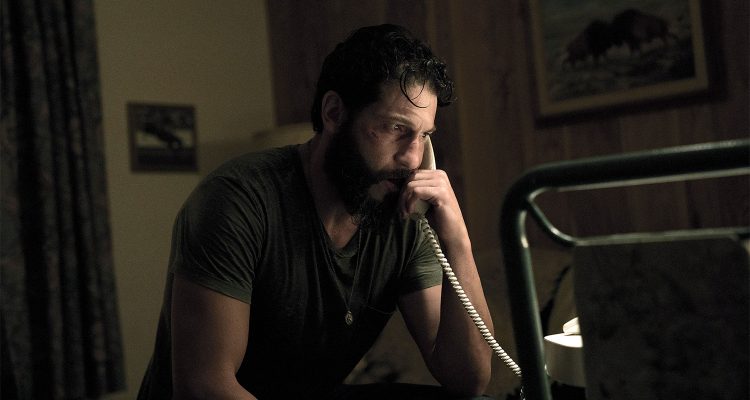Christopher Abbott continues to glower his way through roles, all furrowed brow and electric intensity, but there are no complaints here. It’s his onscreen magnetism that makes much of “Sweet Virginia” work, a simmering body of violence that lashes out in unexpected moments. A movie that forgoes solid storytelling for an atmosphere that keeps you captivated, director Jamie M. Dagg has made a film that plays with genres from neo-noir to thriller to even horror. But while the movie engages each genre, they’re utilized with varying degrees of success.
After a small Alaskan town is rattled from a burglary-homicide by a mysterious outsider, the residents are faced with the fear of the unknown as a shadowy presence lurks around them, threatening their relative peace. That shadow is Elwood (Abbott), a newcomer who ends up as a tenant at Sam’s (Jon Bernthal) motel, and from there, their lives continue to intersect as both grapple with dangerous paths and uncertain futures.
READ MORE: 2017 Tribeca Film Festival Preview: 20 Must-See Films To Watch
The ensemble cast is uniformly great, with Imogen Poots and the always excellent Rosemarie DeWitt making the most of relatively underwritten roles. Bernthal works beautifully in an against-type role, using his mass and imposing stature as a shield against outsiders rather than a weapon. His character, Sam, with his tremor and his limp from his former career as a bull rider, is a remarkably physical role, but that physicality is exploited the most in the manner in which he retreats into himself. It’s a reminder that Bernthal is a versatile chameleon as an actor, despite a physique tailor-made for superhero stardom.
Of course, though, as has become expected since “James White,” it’s Abbott who steals the film, allowing Elwood to be menacing, but unpredictably so.
“Sweet Virginia” excels in its mood, possessing a quiet confidence in its tonality. Jessica Lee Gagné’s work as cinematographer is superb, with compositions that so beautifully build off the natural lighting of the surroundings that there are moments where the background looks unreal. It’s the technical successes that make “Sweet Virginia” stronger than what the the occasionally weak script allows. Dagg is a tremendous director when it comes to building tension, utilizing well-composed wide and lingering shots that leave you on the edge of your seat.
Despite the thriller and character drama that builds the premise, the tone captured overall is that of an old-school horror film. This is particularly obvious in two slow-burning scenes with Poots’ character, Lila: one hints at a drive-by stalker, another nerve-wracking sequence intensely suggests danger emerging from the shadows at any moment.
If it weren’t for the talent of the director and the innate charisma of the cast on board, “Sweet Virginia” might not work nearly as well as it does. Despite its understated nature, there is something thrilling and immediately engaging about the picture, likely due to its urgent sense of oncoming peril. Yet, style isn’t enough to sustain a film, and the screenplay by Benjamin and Paul China leaves a lot to be desired. It’s difficult to fully invest in characters if their lives and backstories are poorly drawn, and this hurts “Sweet Virginia” on the whole. Each character is intriguing to watch as plot devices but never feels like they’re taking natural forward steps in their own lives. Instead, the script forgoes character beats for big moments or atmosphere, and while satisfying early on, the results ultimately are muddled by the end.
Regardless, it’s an enjoyable film, and at the very least allows yet another strong showcase for Abbott and his immense talents. “Sweet Virginia” won’t go on to challenge other films within its genre, but at least it’s entertaining enough from the moment the opening credits begin that we don’t mind so long as the narrative momentum keeps up with the audience’s attention span. [B-]
Follow along with all our coverage of the 2017 Tribeca Film Festival.

